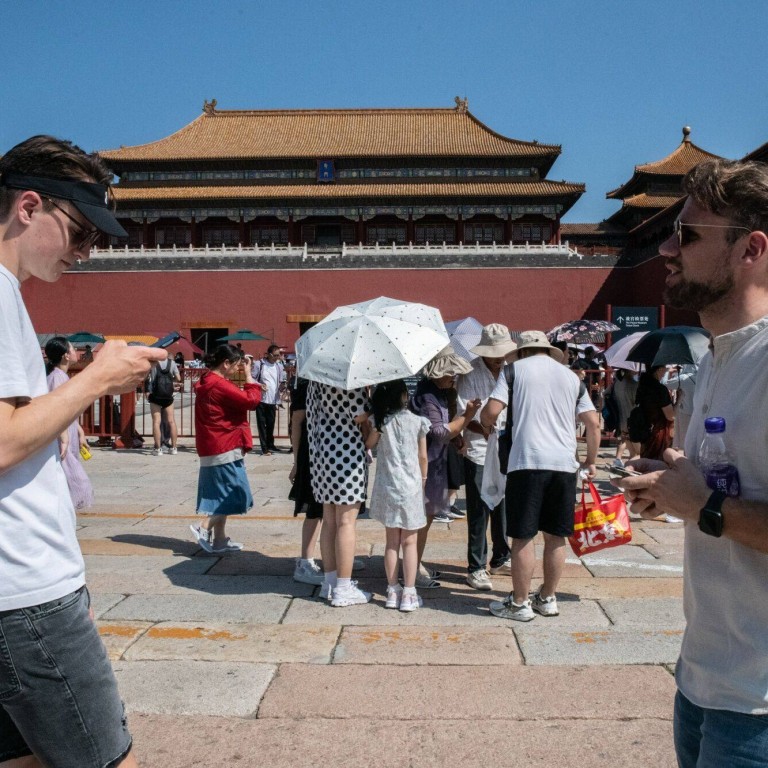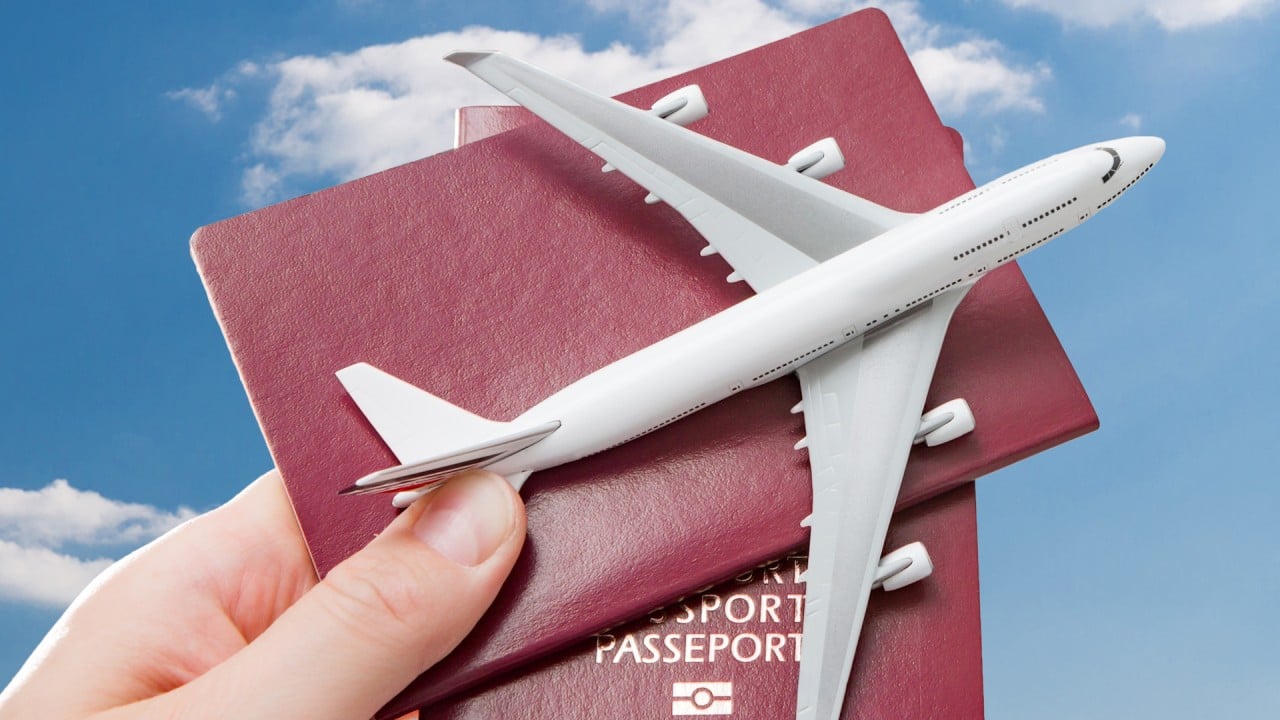
China visa-free travel: relaxing entry restrictions adds up, with ‘additional stimulus’ eyed from more inbound trips
- Foreign visitors to mainland China say they are more willing to visit and splash out hundreds of US dollars a day on flights, retail spending and dining if they can get in for free and avoid troublesome applications
- As the world’s No 2 economy struggles with weakened consumer demand, Beijing has been trying to court foreign investors and tourists
French national Marc Guyon travelled to China on the first day that Beijing began allowing citizens of his homeland to enter visa-free.
For his weeklong trip to Shanghai and Beijing in early December, the Hong Kong-based gym operator saved himself from having to wait three months – at a cost of at least HK$1,500 (US$192) – for a mainland Chinese visa, as had been previously required.
And during that trip, the 39-year-old spent more than HK$10,000 while visiting fellow French people living on the mainland and building up a networking platform that he runs.
“I think what this policy makes different is that people who didn’t have to go to China would take a flight now and be open to more opportunities,” Guyon said.
Guyon’s story appears to illustrate exactly what China’s economic planners have in mind as they look to beef up tourism and investment by enticing foreigners to visit and spend, according to analysts who follow the country.
Liberalising inbound travel, some say, could inject at least US$200 per day per person into domestic airlines, hotels, retail and conferences as the world’s second-largest economy struggles with consumer demand and a property crisis.
Trips to China by citizens of six countries granted visa-free status totalled 147,000 from December 1 to January 9, according to the People.cn news website.
“Stepping back from it, I think the important thing is this seems to signal a more open mindset from China in trying to encourage not only outbound but also inbound travel,” Deirdre Fulton, a partner with London-based aviation consultancy Midas Aviation, said during an industry webinar in January.
From December 1, China began allowing citizens of five European nations and Malaysia visa-free entry for up to 15 days. Ireland, Singapore and Thailand later joined the list, while visa applications have been simplified for people from other countries.
Analysts expect China to keep relaxing the rules, including permission for more nationalities to enter visa-free.
Japanese investors call on China to finally resume visa-free entries
“I think this is a safe bet,” said Nick Marro, lead analyst for global trade with The Economist Intelligence Unit. “China is desperate to revive foreign investor confidence.
“Streamlining visa approvals and getting people back into the country is one way to do this, [and] one which the government can pursue without making more painful, structural adjustments to the business environment.”
Countries generally require visas to control the flow of visitors, prevent illegal immigration and vet foreigners.
Foreign travellers in China spend an average of US$200 to US$300 per day on sightseeing, said Steven Zhao, CEO of the Guilin-based online travel agency China Highlights, last week.
Inbound tourism arrivals totalled 145.31 million in pre-pandemic 2019, with revenue of US$131.3 billion, according to estimates by Travel China Guide, a travel agency. Entries and exits by foreigners last year reached 35.48 million, according to National Immigration Administration figures.
Life is much easier without a visa, and this also helps us come more often to China
“Hotels, restaurants, retail businesses and transport benefit the most from an increase in visitors,” said Douglas Barry, a Washington-based consultant who follows US-China trade. “China has a huge internal market to pick up the slack, so it’s significant that the government finds it isn’t enough and digs deeper into its toolbox, looking for additional stimulus.”
Chinese airlines in particular will welcome any influx in foreign arrivals, said John Grant, a senior analyst with the British aviation intelligence firm OAG.
“Chinese carriers currently have an excessive dependency on their local market, and China’s economy is struggling, which leads to struggles for the airlines,” he said.
Airports Council International, a 2,000-member trade association representing airports from around the world, advocates for visa-free travel to allow “connectively and new routes”, explained director general Luis Felipe de Oliveira.
“That’s a big improvement,” he told the Post on Friday after visiting four Chinese airports over three days. “Life is much easier without a visa, and this also helps us come more often to China.”
More Chinese expected to travel abroad for Lunar New Year
People who have tried the 15-day visa-free scheme say it works, save for occasional time-consuming questions from airlines or hotels that might still expect to see visas.
Caroline Cannac, a French national, recently spent a 30-hour Christmas holiday in the southern city of Shenzhen because she could get in visa-free, avoiding a HK$500 application fee. During their overnight stay, she, her husband and their two adult children spent 2,000 yuan (US$278) in cash – including 600 yuan on a traditional roast duck meal. That was on top of the HK$3,800 they had paid when pre-booking a high-end hotel.
Her husband, a British citizen, got a Shenzhen-only visa at the border with Hong Kong, where they live.
Cannac plans to return for day trips, even just to “look for a couple of chairs” as furnishings.
“I’ll definitely go back, and I was even thinking, for my husband’s birthday, of taking him to Shenzhen,” said Cannac, 54, describing the city as greener and quieter than she had remembered from a visit about eight years ago. “As long as they keep it free, I will go.”
Maybe [a visa-free entry] would make it easier if they didn’t ask me so many questions
However, inbound tourism under slackening visa rules will have a “minuscule effect” on China’s overall economy, Marro said.
Even in China’s peak tourism years before the pandemic, individual arrivals mattered less than foreign companies, said Alicia Garcia-Herrero, chief economist for Asia-Pacific at French investment bank Natixis.
“It’s how many companies come, because that’s the big ticket,” she said.
Jeremy Carmona, another French national in Hong Kong, was not sure about whether to keep using a pre-existing multiple-entry visa when he made a factory-inspection trip last month to the eastern Chinese city of Ningbo, Zhejiang province.
The 30-year-old has visited the mainland “hundreds of times” but said immigration agents raised a series of questions in January about the purpose of his four-night trip after he showed a visa.
“Maybe [a visa-free entry] would make it easier if they didn’t ask me so many questions,” he said, then added: “But maybe they’d ask me even more questions.”


